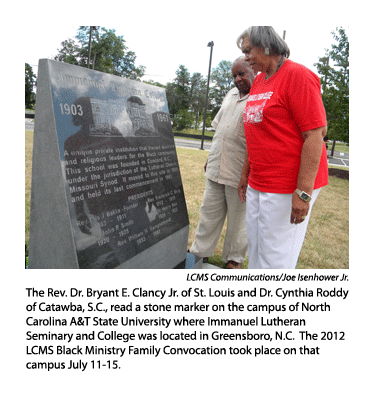By Joe Isenhower Jr.
GREENSBORO, N.C. — Participants in the 2012 Black Ministry Family Convocation here July 11-15 heard plans for a new association of congregations and individuals in black ministry to stay connected and remain as a driving force in the Syn
This convocation — sponsored by the LCMS Southeastern District Coalition of Lutherans in Black Ministry and drawing some 225 registrants — was the first one since restructuring resolutions adopted at the 2010 Synod convention led to elimination of the Synod’s Board for Black Ministry Services (BBMS). Previously, that board planned and sponsored the biennial convocations, which are planned to continue with the new association.
“Sing to the Lord a New Song” (from Psalm 96:1) was the theme as convocation-goers gathered at North Carolina A&T State University for worship, Bible study and hymn singing, along with presentations by speakers including Synod President Rev. Dr. Matthew C. Harrison, meals and other fellowship opportunities.
The A&T campus holds special significance as the site of Immanuel Lutheran College (ILC) and Seminary, a school of the former Synodical Conference, which closed that school in 1962. Many of its alumni took part in the convocation. Also participating were about 18 young people who participated in their own convocation youth-track activities.
Harrison, speaking on the last full day of the convocation, led a Bible study on the Synod’s Witness, Mercy, Life Together emphasis and provided an update on a wide range of topics of interest in the Synod.
Touching on “countless struggles” and concerns of African-Americans down through the years, including those in the LCMS, he told the assembly, “I find it amazing that you are in the Missouri Synod and that you love it. I thank you for being Lutheran.”
Other speakers included:
- the Rev. Donald Anthony, pastor of two LCMS congregations in North Carolina and chairman of the LCMS Black Clergy Caucus.
- Martha Mitkos, LCMS campaign director of the Lutheran Malaria Initiative (LMI). Mitkos spoke about LMI after the opening Communion service — at which the offering was designated for the initiative.

- the Rev. Dr. Lawrence Rast, president of Concordia Theological Seminary, Fort Wayne, Ind., who gave a detailed historical overview of black ministry in the Synod.
- the Rev. Bart Day, executive director of the Synod’s Office of National Mission (ONM), who described that office and how it exists to serve the needs of congregations and districts.
- the Rev. Gregory K. Williamson, the Synod’s chief mission officer. Williamson spoke about the Synod’s mission statement, its Witness, Mercy, Life Together values, its mission priorities, and its vision (with goals of being “globally integrated, culturally focused and seamlessly unified”).
- the Rev. James McDaniels, pastor of St. Luke Lutheran Church, High Point, N.C., who was instrumental in planning and making the convocation a reality, along with his wife, Janis. The McDaniels also helped facilitate discussion at several points in the convocation program.
- the Rev. Dr. Victor Belton, pastor of Peace Lutheran Church, Decatur, Ga., and a member of the Synod Board of Directors.
- Nikki Rochester, chair of the Southeastern District Coalition of Lutherans in Black Ministry. She gave an overview of “The Black Ministry Agenda” that was accepted for discussion by the 1988 LCMS Black Ministry Convocation, and which will be considered as the new association forms.
- Dr. Cheryl Washington, vice-president of Academic Affairs at Concordia College Alabama, in Selma. Representing the college’s president, the Rev. Dr. Tilahun Mendedo, Washington spoke of many recent positive developments for the school.
Day explained in his presentation that the ONM’s “new way of thinking” that applies each ministry area of that office to the needs of rural/small-town ministry, urban ministry and suburban ministry grew out of discussions at the LCMS National Mission Conference last year.
He said he thinks the new black-ministry director position with the ONM — expected to be filled by later this year — “is a great opportunity to sing a new song, expand and integrate black ministry into parts of the Synod where it has never been before.”
In addition, there were two interest-center presentations.
“All of you have made your way here to sing a new song,” Anthony said in his sermon for the opening Communion service. Thanks to God that through His Son Jesus Christ, we have a new song to sing every day. … We can look faithfully forward because we serve the one true Lord who continues to do good for us.”
Later, in his report for the Black Clergy Caucus, Anthony explained that the caucus is “designed to help address the particular needs and concerns of black ministry, to provide a forum for clergy fellowship and networking, and an agent to help identify areas where the ministry of our Synod could be more inclusive.”
He also said that after the caucus saw “the handwriting on the wall” about the Synod restructuring, it formed a joint task force with representatives of the BBMS. That task force has met with LCMS President Emeritus Rev. Dr. Gerald B. Kieschnick and Harrison to discuss its concerns.
Plan for association
The plan for the new association was supported by those on the task force and Harrison has assured task force and caucus members that there will be a director for black ministry on the ONM staff.
Belton laid out the rationale for the new proposed association to the convocation, also describing its form and functions via a PowerPoint presentation.
“The ship has set sail,” Belton said of the Synod restructure, which is now in place. “We must be strategic to catch it and get on it. … The time for self-determination, planning and execution is now.”
Belton — and others later — noted that the late Rev. Dr. Richard C. Dickinson, a long-time black-ministry leader in the Synod, supported the model for the association.
Belton described the proposed Association of Congregations in Black Ministry as a “loosely-organized affinity group” that would “elect some officers,” organize the biennial convocations, “strategize for mission expansion” and expand funding.
“The [association] will exist to enhance the outreach and service of members and member congregations,” Belton told the assembly. He added that pastors whose congregations belong to it or who are individual members “will be supported by means of a fraternal support and growth group that will meet bi-monthly for encouragement and mutual support.”
In addition to being “dedicated to growth of congregations and members,” he said the association would also foster recruiting prospective pastors and other workers in black ministry.
Belton later told Reporter that a number of leaders in LCMS black ministry had indicated their willingness to become involved in the association, and that the staff member for LCMS black ministry might be in place in time to help plan a black-ministry summit conference suggested for 2013.
Speaking also for other leaders in Synod black ministry, he said, “overall, we’re feeling positive that the restructure has left us with a structure that is nimble, so that we can move well within [the new] structure.”
‘Proud … together’
Reporter asked Harrison about his impressions of the 2012 convocation and the new association.
“I wish every person in the LCMS could spend time I’ve been blessed to spend with African Americans in the LCMS,” Harrison responded via email. “All of us would be proud to be in this church together. The long history of black ministry associated with the LCMS is full of deep challenges, but [also] many, many blessings.
“We are in a period of transition as we live into the new structure of the Synod,” he continued. “I very much appreciate the conviction of Pastor Belton that those in black ministry have great assets, and these assets need to be identified and brought to the table as strengths to be leveraged. I’m optimistic.”
The Rev. Dr. Bryant E. Clancy Jr., executive director of the Synod’s Board for Black Ministry Services from 1990 to 2002, is a member of the Black Clergy Caucus and an advisory member of the task force that has met with Kieschnick and Harrison.
He said he is convinced that the convocation this year “accomplished what we thought it would accomplish,” especially in bringing together “a committed group of people to further advance black ministry in our church. … We celebrated our ministry around Witness, Mercy and Life Together, he said.
Concerning the loose association, Clancy said he is satisfied that participants “want to move forward with it, want to make it happen.” He added that preliminary plans are already in the works to hold a 2014 convocation in Kansas City, Mo.
Clancy, who recalls that he has attended every convocation since the first one in the late 1970s, is a 1961 alumnus of Immanuel Lutheran Seminary.
Immanuel ‘a blessing’
Among those also speaking during a time of tribute to Immanuel Lutheran College and Seminary was the Rev. Dr. Frazier Odom, an alumnus of that college who served as the last interim executive director of the LCMS Board for Black Ministry Services from November 2008 until 2011.
“I believe Immanuel was a blessing to the church,” Odom said. “For many years, there were new black pastors from that school. … But even at reunions, we must look ahead. We can’t look back.”
To “those of you who are wishing for a greater influx of black pastors, wondering where we’re going to get the pastors,” Odom continued, “the answer is from your congregations. … Raise up your young men, nurture them, set them aside, and encourage them. Say ‘we need you, because God has need of you.’ ”
Dr. Cynthia Roddy — from Catawba, S.C., and a 1957 graduate of the college’s high school program — said she was “very appreciative” of Immanuel.
Roddy spoke of three “very precious gifts” from ILC: faith, friendship and the “charge of service to ‘go therefore and make disciples of all nations.’ “
On the final evening of the convocation, Roddy presented $1,000 scholarships from the ILC alumni association to two young black men preparing for their first year in college. The association awards such scholarships on a regular basis.
Betty White, a lifelong member of Mount Calvary Lutheran Church, Kannapolis, N.C., who has attended at least six convocations, said she “love[s] to sing to God’s glory.” She made that very clear with her spirited participation in the opening Communion-service choir and whenever the assembly sang hymns — which was often.
White said the “Sing to the Lord a New Song” theme of the convocation “makes me aware of what it means to start anew — even singing old songs. But it also applies to our witnessing as Lutherans, and especially black Lutherans. We have to adjust to reaching out in a winsome way in today’s culture and maintain our doctrine and practice.”
White also said she appreciated the Thursday interest center led by Sanya Parson, director of a tutoring and mentoring program. White said she planned to share a number of Parson’s ideas and insights at her home church, which also conducts an after-school program.
Concluding the convocation Saturday on the A&T campus was a dinner-theater presentation of a dramatization based on the “Juneteenth” emancipation of the last slaves in the United States during the mid-1860s. Its playwright, Patricia Fortune, attended ILC’s high school.
And for Sunday morning before convocation participants headed their separate ways, it was suggested that they worship at one of three LCMS congregations in the Greensboro area.
Posted July 26, 2012

